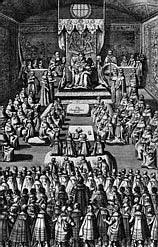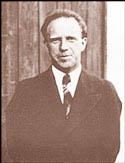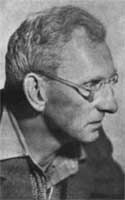

Making Science More Cuddly
In England, the House of Lords has just published the findings of its Select Committee on Science and Technology. It makes uncomfortable reading for scientists, calling as it does for more than 'transparency', open regulation' or even 'public understanding' According to Lord Jenkin, who was the Committee's chairman, what is needed is 'real two-way dialogue'. Another peer, the well-known fertility expert and broadcaster Lord Winston, said 'Scientists are servants of society, not its masters. ' In the British Isles, public confidence in science has been severely shaken by two food crises: the BSE scandal, and the campaigns against Genetic Modification of crops. Lord Jenkin added that, paradoxically, Science has never been more exciting. Recommendations from the Lords concerned a greater degree of openness, dialogue as an integral part of research, media training for researchers, rewards for scientists who bring their work to a wider audience, an awareness of the social context of scientific work, initiatives to promote women's understanding of science, as well as some measures sympathetic to scientists to protect them from harsh criticism.
And More Sexy?
What could be done to make science more sexy? Roger Highfield, Science Editor of the Daily Telegraph obtained some answers: Jaqueline Mitton of the Royal Astronomical Society wanted scientists to be more delighted with their work, more enthusiastic Dr. Raj Persaud of the Maudsley Hospital thought scientists whould consider why alternatives to science, like astrology and the paranormal, are so popular with the public. Graham Farmelo of the Science Museum said the public should see much more of the human face of scientific research. Sir Aaron Klug said science needs to engage more with popular culture. He even went so far as to suggest docu-soaps on TV, with real scientists in cameo roles.
Eternal Youth etc.
The Wolfson Institute, a £50 million Institute for Biomedical Research has just opened in London. Work being done there that is already being discussed includes:
- The 'secret of eternal youth'. Experiments on mice have indicated that it might be possible to develop a pill which would reverse the ageing process of the brain. Apparently a gene called KVB1 aids the learning process in young people, but as people grow older the same gene actually impairs learning and memory. Dr. Karl Peter Giese wants to develop a memory tablet for the elderly. His research has obvious implications f or the treatment of Alzheimer's disease.
- New antibiotics - or a 'new penicillin'. In the drugs and bugs and conflict, some of the bugs have been winning, notably MRSA, the Staphylococcus aureus. Penicillin and other medicines have diminished in their effectiveness. New techniques at the Wolfson Institute will allow scientists to analyse, identify, target and - it is hoped - destroy specific harmful genes. Dr. David Madge is convinced that identifying essential bacteria genes provides a good chance of creating effective antibiotics.
- Limiting stroke damage. Brain cells 'talk to each other'. Professor John Garthwaite is examining what goes wrong in that communication, as a means to understanding brain disorders. He is also trying to gain a clearer picture of what happens when brain cells die.
- The regeneration of cells. Egg and sperm cells can constantly renew themselves without becoming cancerous. Professor David Beach is convinced that this could lead to new ways being developed to 'repair' cells. Cancerous cells divide uncontrollably and invade surrounding tissue, but normal human tissue divides a certain number of times and then stops doing so.
Memory of a Genius
A British journalist, Jeremy Campbell, reports that the London stage hit, Copenhagen, which tells of the relationship between Niels Bohr and Werner Heisenberg, seems about to do well in New York, too. Campbell recalls meeting Heisenberg in 1973, 'he had genius written all over him.' Heisenberg told Campbell at that time, 'If I was staring out today I wouldn't go into physics. I'd be a biologist. That's where all the exciting work will be done in the next several decades.'
Presenting Science
The Grammar School in Aylsebury is, in most ways, just like any other school, except that when the pupils from eight schools gave evidence on their findings on a range of topics, including diabetes, and the mutjac deer of the fens, the Aylsebury school won the Top UK Science Presenters Award for 1999. Each year an organisation called Express Yourself encourages pupils from around Britain to undertake research that is outside their curriculum. Regional conferences are held, the findings of young scientists are assessed, and the grand final is held at the Royal Institute in London
Do As Yer Like Kids
Summerhill, a school established in England in 1921 by one of the greatest and most controversial educators of the 20th Century, A.S. Neill, has once again been threatened with closure. It survived the Appeals Tribunal during March. Neill's dream in 1921 when he established Summerhill, was to offer a haven for children, a place where they could learn to build a community free from adult authority. Pupils there used to be known as the 'Do-as-yer-like-kids'. According to Neill, 'The curse of humanity is the external compulsion.' Neill's daughter, Zoe Readhead, 53, now runs the school, keeping up the principle that Summerhill pupils are never obliged to attend any lesson. They learn whatever they need to learn whenever they feel ready to learn it. Visitors to Summerhill see youngsters appearing to be idle, but when they work they really work. Many ex-pupils have become achievers, like TV executive Penny Anderson, and its celebs include actress Rebecca de Mornay and journalist Angela Nuestatter. Most ex-pupils agree that there were certain gaps in their education, but that their lifelong love of learning means that they have always been able to absorb material when necessary. It's a tribute to Summerhill that these ex-pupils have felt since childhood that the world is on their side.


